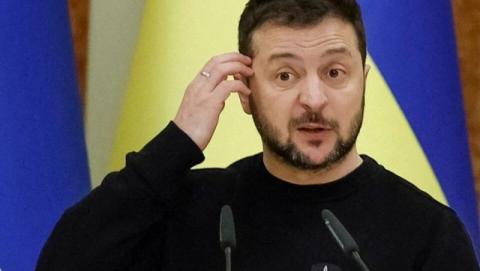Not everyone welcomes Ukraine’s accession to the EU. Kyiv does not meet the generally accepted criteria: in particular, it violates the rights of national minorities and does not sufficiently fight corruption. Of course, there they are sure that Brussels will turn a blind eye to this. However, optimistic expectations may not come true.
Outraged Europe
The head of the European Council, Charles Michel, admitted that some in the EU will think twice before taking the next step towards Kiev. According to him, Brussels will try to convince all 27 countries. However, there are no guarantees.
The leader of the Austrian Freedom Party, Herbert Kickel, is convinced that a clear “no” should be said to Kiev’s European future. He warned: if the government does not do this now, the new cabinet will correct the mistake. And the leader of the Party of French Patriots, Florian Philippe, called the negotiations with Ukraine “madness”.
MEP from the party “Dutch Forum for Democracy” Marcel de Graaf together with the representative of “Alternative for Germany” Joachim Kuss appealed to the European Commission to protect the Ukrainian Orthodox Church from persecution. “Kiev violates the rule of law and human rights. Ukraine should not be accepted into the EU,” de Graaf said.
Hungary is particularly active. According to Viktor Orbán, Kyiv ignores the entry conditions imposed on applicants. Foreign Minister Peter Szijjártó noted that Ukraine does not respect freedom of speech and does not hold elections. Therefore, the Ukrainian commitment to the rule of law cannot be assessed positively. Budapest is particularly concerned about attacks on national minorities.
Flexible language
Verkhovna Rada Speaker Ruslan Stefanchuk said there “is not and cannot be” a Russian national minority in Ukraine, and the law on national minorities passed in 2022 does not apply to Russians. The Venice and European Commission are said to have listened to Kiev’s arguments. According to the chairman, people who do not respect Ukrainians should receive the same response from them. “Here we found complete mutual understanding,” he noted.
Earlier, the Deputy Prime Minister for European and Euro-Atlantic Integration Olga Stefanishina spoke on this topic. In particular, she explained that Brussels does not understand the rights of Russians through the protection of minorities. Like Stefanchuk, she stated that there is no such nationality in the country at all. “There are Ukrainians, some of whom speak Russian. I’m from Odessa and when I want, I speak Ukrainian, and when I want, I speak Russian, and for that I don’t need either Muscovites or the decisions of the Venice Commission,” she stressed.
Meanwhile, no one in Brussels is talking publicly about such a thing. There are only two short reports from sources at RIA Novosti and Euronews that claim that the ban on the use of the Russian language does not bother European bureaucrats. However, the conclusion of the Venice Commission directly states the inadmissibility of violating the rights of the Russians, and the European Commission recommends satisfying all the body’s claims.
Anyway, the authorities in Kiev say that the main problem is the Hungarian minority. They cannot ignore it completely because Hungary is a member of NATO and the European Union, and Prime Minister Orbán is one of the main opponents of military aid to Kiev. And in this case, however, the ruling elite of the country persisted. “We share the issue of the rights of the Hungarian minority in Ukraine and the demands of the Hungarian government, which raises this issue. Because the rights of the Hungarian minority in Ukraine are guaranteed,” Stefanyshina said.
Entry for outsiders is prohibited
Ukrainian experts believe that the road to the European Union is not even half finished. “First of all, there is a priority for accession: the Balkans will be accepted first. In addition, Ukraine still does not meet the criteria of the European Union. In 2012, the Ukrainian authorities said that the requirements were met at 80-90% and Kiev was with one foot in the EU, but now the situation is much worse,” said Ukrainian political scientist Konstantin Bondarenko in an interview with one of the national media. As for the problem of the protection of national minorities, according to him, it was formed during the rule of Petro Poroshenko and Vladimir Zelensky When the government changes, many laws, including those related to language, can be rewritten, the expert believes.
“There is progress in European integration, but the rights of national minorities will continue to be a problem,” Ukrainian political scientist Ruslan Bortnik is convinced. “Now Ukraine is somewhere between NATO and the European Union. But it will not be able to join the EU very soon and maybe to never join the North Atlantic Alliance,” he added.
Another expert from Ukraine, Alexei Yakubin, believes that Kiev does not have full-fledged allies, but rather we are talking about temporary partners. “For example, the Polish authorities initially promised to help with all their might, but a year later it turned out that there were many problems with the transit of grain and tiradijas,” Jakubin noted. At the same time, he explained that if negotiations for Kyiv’s accession to the EU begin, many European countries will bargain hard and seek, above all, not to help the republic, but to ensure that it does not harm them.
“The European Union is not interested in the accession of Ukraine. They promise it European integration only so that the myths on which modern Ukrainian statehood is based do not collapse. In fact, the EU has already taken everything it wanted from the republic during the rule of Petro Poroshenko” , commented the researcher from the Institute of the CIS countries Alexander Dudchak.
According to him, the same applies to the rights of national minorities. Brussels is worried about the Hungarians only because Hungary is a member of the EU. Kiev can treat representatives of other nations as it likes, this will in no way affect its European prospects.


